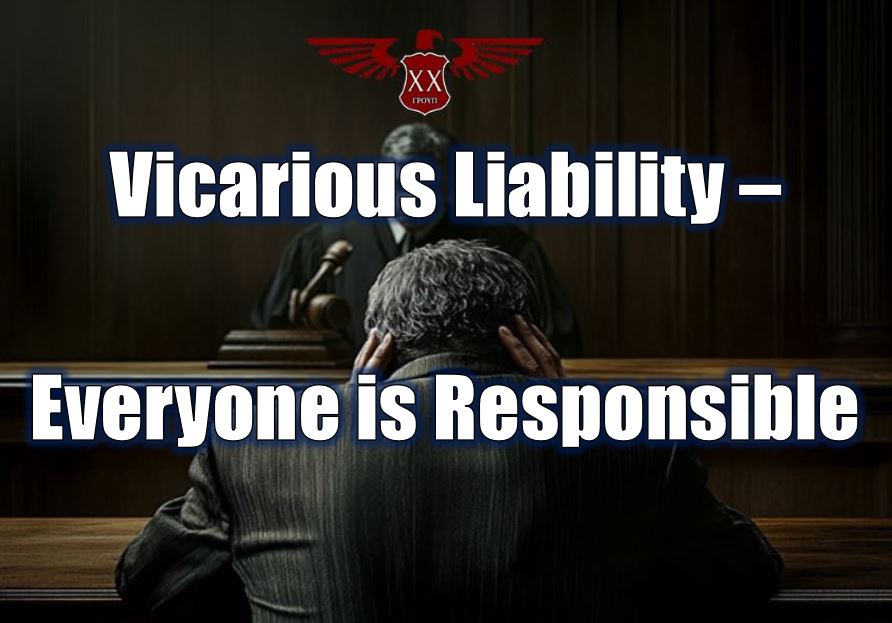YOU the lender and YOU the Forwarder are responsible for any and all actions of the person you hire to handle the repossession assignment
EDITORIAL
As an “Expert Witness” working on wrongful repossession cases based on a breach of peace, I often encounter a lender who believes they are relieved of liability because they have hired a third party to handle their repossession assignment. These lenders do not understand that they are held responsible for the agent they hired based on Vicarious Liability standards.
In today’s litigious society of consumers and their attorneys it is imperative that both lenders, forwarders and recovery specialists clearly understand the definition and application of the term “VICARIOUS LIABILITY”.
A clear understanding of the term and its implications could save all parties involved millions of dollars in attorney fees, adverse publicity, court costs and plaintiff awards.
VICARIOUS LIABILITY is strictly defined as a form of liability which arises under common law doctrine related to the responsibility of the superior for the acts of a subordinate. In a broader view it would cover the responsibility of any third party that has the right, ability, and duties to control the activities of a violator.
Vicarious Liability as defined by Wex | US Law | LII / Legal Information
“Vicarious liability, also known as imputed liability, is when a principal party is responsible for the actionable conduct of their agent based on the relationship between the two parties. Vicarious liability falls under the respondeat superior doctrine and is thus a type of strict liability because the principal is in control of the agent and the agent’s actions represent the principal.”
VICARIOUS LIABILITY in the recovery of mortgaged property revolves around duties fixed by law rather than any contractual agreement and relates to the use of a subordinate (independent contractor, employee, etc.) requested to perform any task where the possibility of damage was reasonably foreseeable.
In the landmark case, MBank El Paso v. Sanchez, 836 S.W. 2d 151 (Tex 1992), the Texas Supreme Court Justices ruled that a secured party bears a non-delegable duty to avoid breaching the peace during self-help repossession. The Justices held that MBank was liable for any physical harm and damages that resulted from the independent contractor’s failure to take reasonable caution against danger. The damages asked for totaled $1,250,000.00.
Simply put, YOU the lender and YOU the Forwarder are responsible for any and all actions of the person you hire to handle the repossession assignment. Independent Contractor Agreements have been shown to be ineffective when there has been a breach of peace.
Be careful when choosing an agent to work on your recovery assignments. Be sure you have written copies of Declarations of Compliance related to GLBA, RED FLAG RULES, TRRPA, FDCPA, SCRA, and FCRA and that the Recovery Agent you choose can show credentialed or certified proof of proper training, carries a dishonesty bond and has adequate and proper insurance coverage.
You should be prepared to prove in a court of law that you and your financial institution have used due diligence in your Recovery Agency selection process.
Always remember that the bitter taste of a highly publicized and costly lawsuit due to your choice of an untrained, non-compliant recovery agent will linger long after the sweetness of a job done at a cheap price.
This information is not intended to be legal advice and may not be used as legal advice. Legal advice must be tailored to the specific circumstances of each issue. Every effort has been made to ensure this information is up to date. It is not intended to be a full and exhaustive explanation of the law in any area, however, nor should it be used to replace the advice of your own legal counsel.












More Stories
Rising Fuel Costs Are Impacting Repossession Operations
Colorado Bill Aims to Severely Impact All Repossession Operations
Today is Fallen Agents Day – 2026
From Auction Cutting to Field Programming: The Structural Shift No One Budgeted For
Bad Apples in the Repossession Industry
Why Self-Help Repossession Is Taken for Granted — and Why Losing It Would Hurt Consumers Most